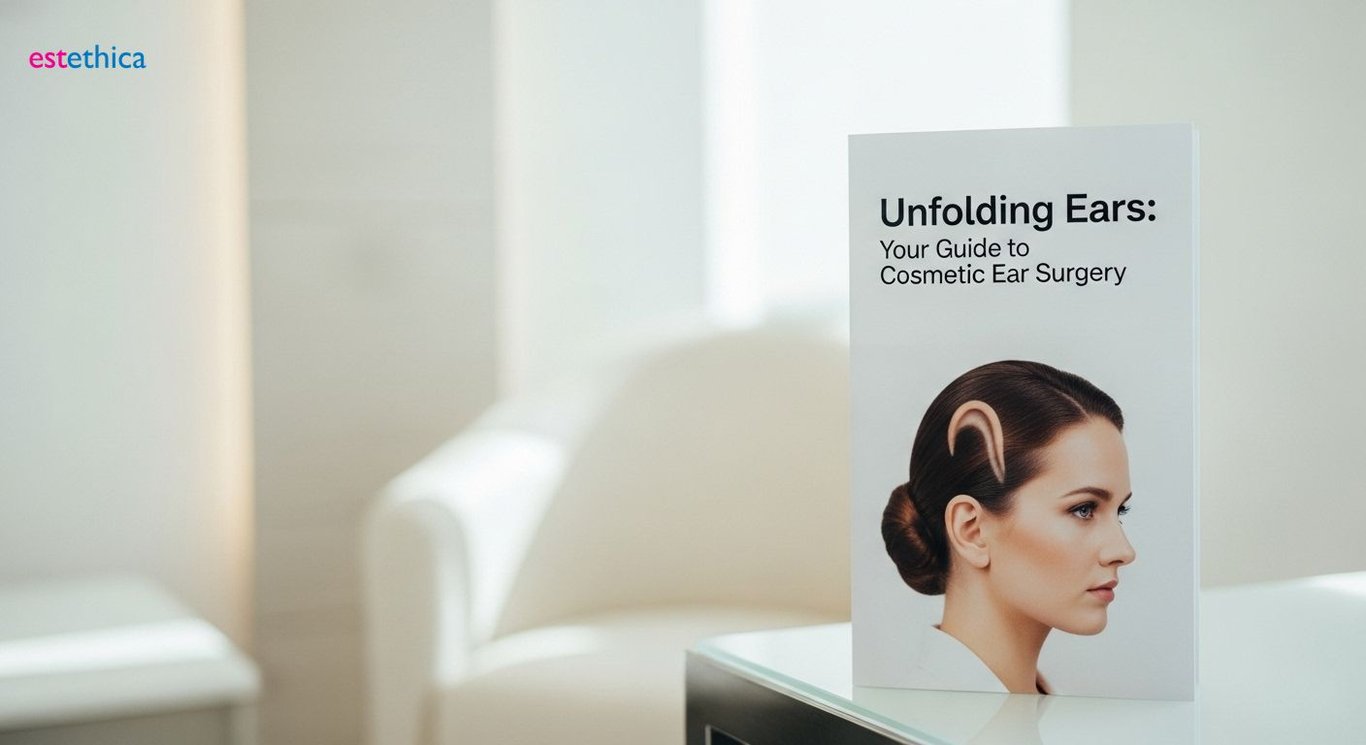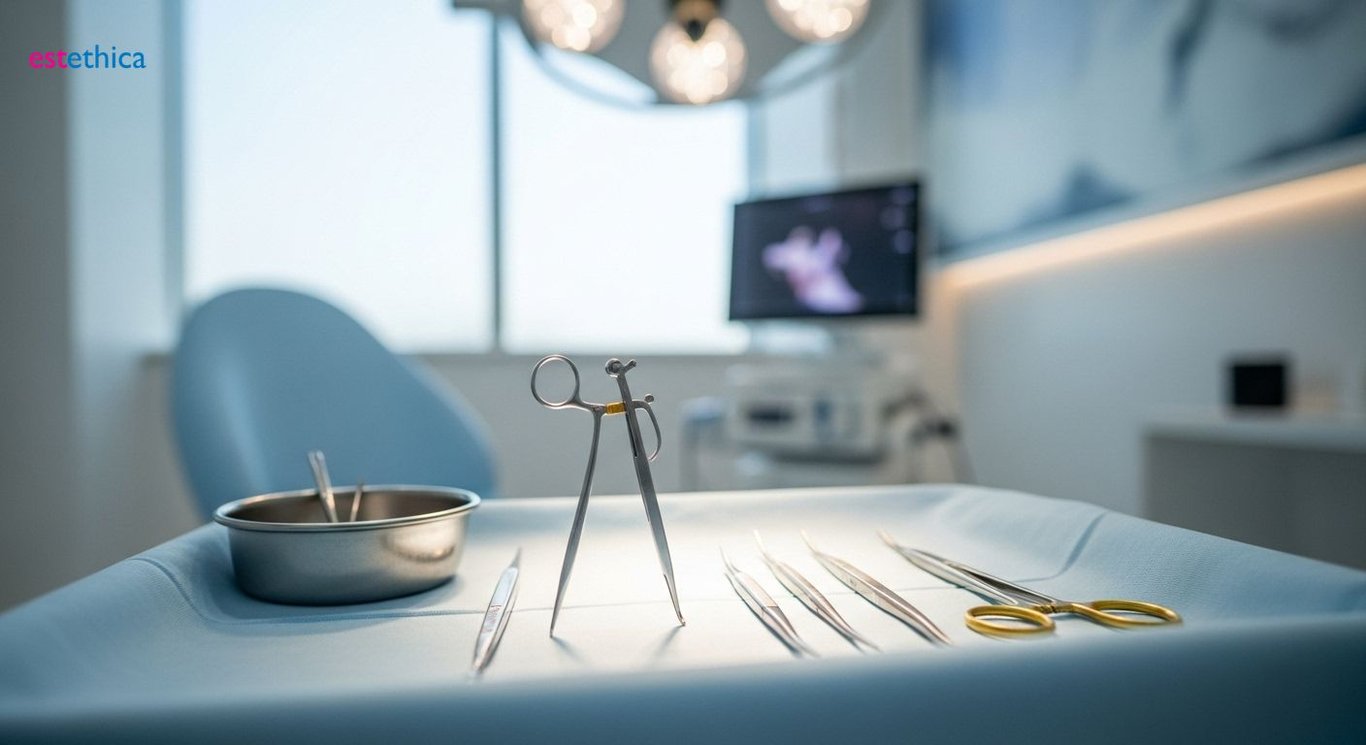Unfolding Ears: Your Guide to Cosmetic Ear Surgery
Experience the transformation with cosmetic ear surgery. Enhance ear aesthetics with expert-led procedures, boosting confidence and achieving natural harmony.
Cosmetic ear surgery, also known as otoplasty, offers a transformative solution for individuals seeking to enhance their ear appearance. Whether due to congenital conditions or personal preferences, otoplasty can effectively address common concerns such as protruding ears. This comprehensive guide explores the cosmetic ear surgery journey, from understanding the procedure to discovering its impact on self-esteem and confidence.
Otoplasty Unveiled: Reshaping Ears for Balanced Harmony
Artistic Approaches in Ear Reshaping
Otoplasty, often referred to as Cosmetic Ear Surgery, involves a suite of techniques designed to correct ear deformities and enhance facial symmetry. Skilled cosmetic surgeons meticulously adjust the cartilage to reduce the prominence of protruding ears, carefully sculpting a more natural and balanced appearance. The precision and artistry applied ensure minimal visible scarring, allowing for a discreet transformation that enhances the patient's overall aesthetic. This specialized approach directly impacts self-image.
The goal is to create ears that are proportionally aligned with the head and face, boosting confidence, especially in cases where children or teens have experienced bullying due to the appearance of their ears. The techniques used consider not only the angle of the ears but also their size and shape, ensuring results that look natural and are in harmony with the individual’s unique facial features. This attention to detail involves Ear Reshaping and refinement, taking into account factors such as age and skin elasticity to provide enhancements that last.
Key Considerations for Otoplasty
- Personalized Assessment: Every patient undergoes a thorough evaluation to identify specific ear characteristics and plan the most appropriate surgical approach.
- Advanced Techniques: Modern otoplasty uses techniques that minimize incisions and scarring, accelerating recovery and improving aesthetic outcomes.
- Realistic Expectations: Surgeons work to ensure that patients have a clear understanding of what otoplasty can achieve, managing expectations for results that align with their facial structure.
This comprehensive customization improves the results of the surgery, which involves adjusting the ear cartilage to correctly position the ears closer to the head. By customizing it to each person, Ear Pinning can enhance the overall physical form and boost personal confidence.
Steps in the Otoplasty Procedure
- Consultation and Planning: Meeting with a surgeon to discuss goals and assess ear structure.
- Surgical Reshaping: Adjusting the ear cartilage to achieve the desired appearance.
- Recovery and Care: Following post-operative care instructions to ensure optimum healing and results.
Otoplasty’s transformative effects are seen not just in physical changes but also in enhanced self-esteem, as 85% of patients report increased satisfaction with their body image post-surgery. With careful preoperative planning, and skilled surgical execution, individuals who undergo otoplasty often report substantial improvements in their social interactions and psychological well-being.

Ear Pinning: Correcting Protruding Ears, Boosting Confidence
Benefits of Undergoing Ear Pinning
Ear pinning, a subset of otoplasty, specifically targets protruding ears that affect personal confidence. This surgical intervention involves positioning the ears closer to the head, reducing their outward projection. The benefits of ear pinning extend beyond appearance, with many patients reporting enhanced self-esteem post-procedure. By addressing the physical concern, ear pinning can alleviate social anxiety and improve interpersonal interactions, leading to a more fulfilling life experience.
One of the main advantages of Ear Correction Surgery is the relative simplicity of the procedure and the typically short recovery time. Patients often return to normal activities within a week, making it a convenient option for those seeking quick improvements. Furthermore, the aesthetic results are usually immediate, providing a significant boost in confidence shortly after the surgery. This immediate gratification can positively influence a person’s overall mood and self-perception.
Ideal Candidates for Ear Pinning
- Individuals with prominent ears seeking aesthetic improvement.
- Those experiencing psychological discomfort due to ear appearance.
- Patients in good general health, understanding the procedure's outcomes.
Suitable candidates for ear pinning often include children and adults who feel self-conscious about how their ears protrude. The procedure is also suitable for people whose ears have not developed the typical fold of cartilage, which makes them stick out further. According to the American Society of Plastic Surgeons, Cosmetic Ear Surgery is most effective in children, ideally performed after age five, when the ears are nearly fully grown.
Aspects of the Ear Pinning Procedure
- Initial Consultation: Discussing expectations and assessing ear structure.
- Surgical Adjustment: Repositioning or reshaping ear cartilage.
- Post-operative Care: Following guidelines for healing and optimal outcomes.
The process begins with a detailed consultation where the surgeon evaluates the ear’s anatomy and discusses the patient's aesthetic goals. During the surgery, which typically lasts one to two hours, the surgeon makes an incision behind the ear to access the cartilage, reshaping it to reduce its projection. The skin is then closed with sutures, positioning the ear closer to the head. estethica clinics prioritize patient care, providing comprehensive post-operative support to ensure a smooth and successful recovery.

Ear Surgery Recovery: Tips for a Smooth and Speedy Healing
Essential Steps After Ear Reshaping
Recovery from Ear Surgery is a journey that demands careful attention for optimal healing. Following the surgeon's guidelines is paramount. This includes maintaining an elevated head position to minimize swelling, meticulously cleaning incision sites to prevent infection, and consistently using prescribed medications to manage discomfort. Each step is tailored to enhance the healing process, helping patients swiftly return to everyday routines with long-lasting satisfaction. Post-operative care is important to reduce complications and enhance overall satisfaction.
During the initial days, patients should avoid strenuous activities that could elevate blood pressure or risk trauma to the ears. Regular attendance at scheduled follow-up appointments is vital. These visits allow the surgeon to assess the healing, address any concerns, and make necessary adjustments to the care plan. Close monitoring helps to identify and manage potential complications early on, ensuring the best possible aesthetic and functional outcomes. Embracing these recovery protocols is key to safely achieving the desired results from the Cosmetic Ear Surgery.
Guidelines for a Successful Recovery
- Keep Incisions Clean: Regularly clean incision sites with a mild antiseptic as directed.
- Avoid Pressure: Refrain from sleeping on your side or using headgear that presses on the ears.
- Follow Medication Schedule: Take all prescribed medications, including pain relievers and antibiotics, as instructed.
Adherence to post-operative instructions is critical for minimizing risks and achieving the intended outcomes of Ear Pinning or Ear Reshaping. By following these guidelines, patients can expect a smoother recovery and enhanced satisfaction with their surgical results.
Recovery Timeline After Otoplasty
- First Week: Focus on rest, managing pain, and preventing infection.
- Two to Four Weeks: Gradual resumption of normal activities, avoiding strenuous exercise.
- Several Months: Complete healing with final aesthetic outcomes visible.
The recovery timeline following otoplasty varies among individuals but generally aligns with these phases. During the initial week, rest is essential, and patients should focus on pain management and preventing infection. Over the subsequent weeks, a gradual return to normal activities is permissible, while strenuous exercises and activities that may put the ears at risk should be avoided. estethica provides detailed aftercare guidelines to support patients through each stage, ensuring a smooth and successful healing journey for anyone considering Protruding Ear Correction.

Is Ear Correction Surgery Right for You? Exploring the Options
Determining Candidacy for Otoplasty
Deciding on Ear Correction Surgery involves a comprehensive evaluation process to ensure alignment with patient needs and expectations. Key considerations focus on evaluating the individual’s general health, psychological readiness, and specific aesthetic goals. Ideal candidates typically exhibit a clear understanding of the procedure, possess realistic expectations about the outcomes, and are motivated by personal desires rather than external pressures. A consultation with a board-certified plastic surgeon is crucial in determining suitability and tailoring the surgical approach to meet individual requirements. At estethica, our surgeons ensure that 90% of patients who undergo otoplasty report satisfaction with the improvements in ear symmetry and overall facial harmony.
Moreover, individuals contemplating otoplasty should have fully developed ears, generally after the age of five for children, to ensure stable and predictable results. Those with underlying health conditions, such as bleeding disorders or active infections, may need to postpone or reconsider the surgery to minimize risks. During the consultation, surgeons assess the ear’s anatomical structure, skin elasticity, and cartilage firmness to determine the most appropriate surgical techniques. Through detailed consultations, estethica aims to provide potential patients with clear insights into whether Cosmetic Ear Surgery is the most suitable option for achieving their aesthetic aspirations.
Factors to Consider for Otoplasty
- Overall Health: Good physical condition minimizes surgical risks and promotes optimal healing.
- Realistic Expectations: Understanding the achievable outcomes enhances satisfaction with the results.
- Psychological Readiness: Emotional stability supports a positive surgical experience and adjustment.
Deciding on Ear Pinning surgery involves assessing several key factors to ensure it is the right choice for each individual. Evaluating overall health, realistic expectations, and specific cosmetic goals is critical. Consulting with a qualified plastic surgeon allows for a personalized assessment, offering clarity on the procedure, potential risks, and desired outcomes. By carefully considering these factors, prospective patients can confidently determine their path toward achieving their aesthetic aspirations, especially with the guidance and expertise available at clinics like estethica.
Steps to Determine Otoplasty Suitability
- Initial Consultation: A detailed discussion with a surgeon to assess ear structure.
- Medical Review: Evaluation of health history to ensure surgical safety.
- Realistic Goal Setting: Establishing achievable outcomes and understanding the procedure.
The journey to Protruding Ear Correction or another form of Ear Reshaping begins with a personal consultation, where the surgeon assesses your ear structure and listens to your aesthetic goals. A comprehensive medical review follows to ensure you are in good health for the surgery. Setting realistic goals is vital for satisfaction with the results, which our estethica team will assist you with. These steps ensure that anyone considering otoplasty at estethica is well-informed and fully prepared for their transformative journey.
Understanding Otoplasty: A Comprehensive Guide
Precision Otoplasty: Sculpting Balanced Harmony with Advanced Cartilage Techniques
Smooth Otoplasty Recovery: Comprehensive Post-Operative Care for Optimal Healing
Frequently Asked Questions
What is Otoplasty and what does it address?
What is the ideal age for Ear Pinning surgery?
What can I expect during the Ear Surgery recovery time?
What are the key factors to consider when determining if Ear Correction Surgery is right for me?
Achieve your aesthetic goals with estethica's expert team and advanced techniques.
📞 Call Now for a Free Consultation!